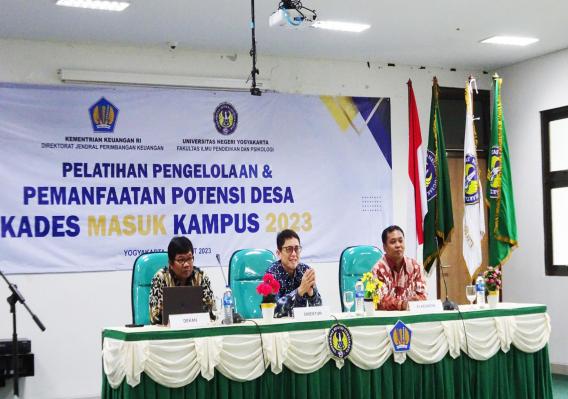Training on Village Potential Management and Utilization for Village Heads in Yogyakarta Special Region

The Faculty of Education and Psychological Sciences, Universitas Negeri Yogyakarta (UNY), in collaboration with the Directorate of General Transfer, Directorate General of Fiscal Balance, Ministry of Finance of the Republic of Indonesia (DTU DJPK Kemenkeu RI), held Training on Management and Utilization of Village Potential (Village Heads Enter Campus) in 2023, Wednesday, (15/03), in the 3rd Floor Hall Room of the Integrated Laboratory of FIPP UNY and the 3rd Floor Hall Room of Muh. Amin SPS Building FIPP UNY. The speakers presented were the Director of General Transfer Funds, DJPK Ministry of Finance RI Ardiyanto, S.E., M.M., M.A., Ph.D., and the Dean of FIPP UNY, Prof. Dr. Sujarwo, M.Pd. Vice Dean for Research, Cooperation, Information Systems, and Business, Dr. Joko Pamungkas, M.Pd., as well as a team from the Department of Out-of-School Education FIPP UNY Dr. Puji Yanti Faziah, M.Pd., Dr. Yudan Hermawan, M.Pd., Dr. Hiryanto, M.Si., Dr. Dafid Slamet Setiana, M.Pd., and Tristansi, M.Pd.
Ardiyanto, in his speech, hoped that the village heads would gain new knowledge to help them make decisions and manage policies in the village government. The activity is also expected to provide greater and more effective results when the experience of the village head and the knowledge possessed by the teachers on campus are combined.
Furthermore, the Dean of FIPP UNY, Prof. Dr. Sujarwo, M.Pd., talked about the urgency of villages as subjects of national development and the paradigm of village development. Sujarwo said the community's commitment and willingness greatly influence the village development's progress. The mindset that must be built when you want to move forward is to get out of your comfort zone. "The village is an extraordinary asset. There are complexes that we can manage and develop. The capital is the willingness of the community. The key word in the empowerment process is awareness," he explained. Sujarwo also explained that universities are ready to help villages to identify problems, conditions, and potentials owned by villages so that villages can optimize them.
Supporting Prof. Sujarwo, Dr. Joko Pamungkas delivered material on the Utilization and Optimization of Villages and Business Insights / SMEs. Joko explained that identifying the village's potential is the first step to understanding and utilizing available resources. Identifying village potential can include analysis of natural, social, and economic resources in the village, as well as analyzing factors that affect the growth and development of the village. The development of micro, small, and medium enterprises (MSMEs) in the village can help improve the economy and welfare of the community. The government and financial institutions can support the development of MSMEs in villages. "Technology can help increase productivity and efficiency in utilizing resources in villages. Examples are the use of agricultural technology such as irrigation systems and organic fertilizers, or information and communication technology (ICT) to improve access to information and communication in villages," he explained.
Dr. Dafid Slamet Setiana, M.Pd., delivered a presentation on MSME Business Models and the Feasibility of Village Products. "MSME development models, such as one village one product, cluster approaches (industrial groups), clustering centre models, value chain-based industrial cluster design, coaching with collaborative, integrated models by building partnerships," he explained.
While Dr. Puji Yanti Fauziah, M.Pd. conveyed the Village Fund Management Policy in 2023 and Village Financial Management. It was explained that the Village Fund is a state recognition fund for the village, so it is empowered to carry out its authority. Village funds must be managed, utilized, and realized as well as possible. The focus of the use of village funds is on solving village problems such as poverty, health, education, etc. Village funds are used for the utilization and development of village potential. The aim is to provide maximum benefits for the village community by improving the quality of life, improving welfare, reducing poverty, and improving public services.
This training activity was attended by 80 representatives of village heads in Yogyakarta. The training was divided into 2 classes A and B accompanied by competent resource persons in their fields. The participants' enthusiasm can be seen from the many questions and sharing experiences from the villagers who attended. (Author: Mareta, Editor: Dedy, Translator: Annisa)






